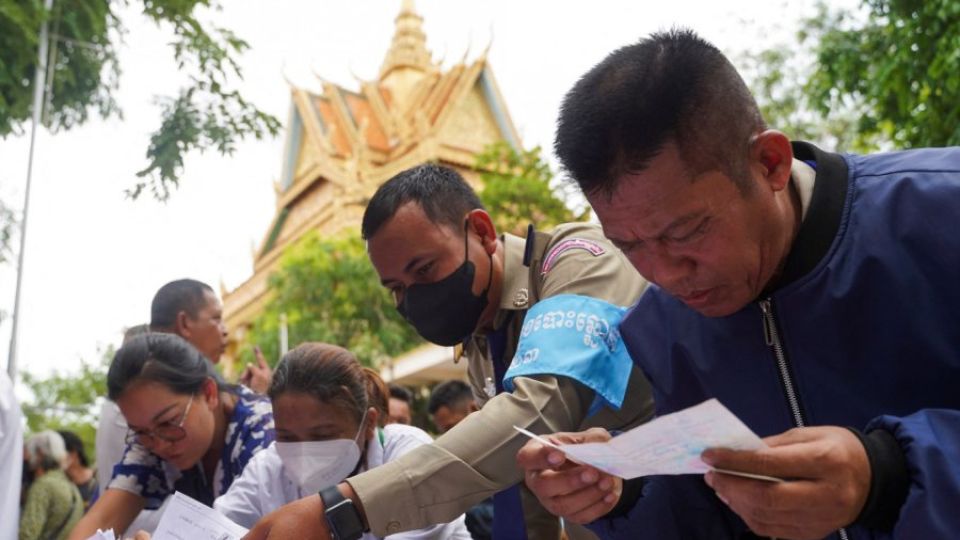July 26, 2023
JAKARTA – Criticism continues to mount over Cambodia’s general election following incumbent Prime Minister Hun Sen’s claim on Monday that his party had won the one-horse race in a landslide, with activists, including those from Indonesia, labeling it illegitimate and authoritarian.
Rallying against the election, which was carried out over the weekend, dozens of human rights and pro-democracy organizations from Southeast Asia have expressed their apprehension, with some urging ASEAN to refrain from legitimizing Hun Sen’s government.
On Sunday, over 8 million Cambodians cast their ballots to choose from the 18 eligible political parties, with the ruling Cambodian People’s Party (CPP) being the strongest among them, without any real opposition.
Holding the record as Asia’s longest-ruling leader, with 38 years in office, Hun Sen in March banned the only real challenger to his governance, the Candlelight Party, from contesting in the July election for alleged faulty paperwork. Hun Sen’s move was also followed up by threats of penalties for any Cambodian citizen seeking to boycott the polls.
The CPP on Monday then announced its victory in securing 120 out of the 125 seats in the parliament, cementing Hun Sen’s grip on the country’s politics ahead of a possible transition of power to his son Hun Manet. The announcement, however, came despite the Cambodian National Election Committee’s statement on the same day that the ballot count had not been finalized.
“Ahead of the Sunday general election, we had expected that the polls would be dominated by the ruling CPP,” Usman Hamid, executive director of Amnesty International Indonesia told The Jakarta Post on Tuesday.
“[…] Several Candlelight Party members have been arbitrarily detained, [and] new regulations came into force aimed at punishing people, [making] further mockery of the right to freedom of expression.”
Marzuki Darusman, a former Indonesian attorney general turned human rights campaigner, said it was “a great regret that the election came with civilian arrests, the dissolving of opposition and press repression”.
“There is no doubt or denying that the election had violated human rights,” he told the Post.
Read also: Cambodia’s ruling party says it won a landslide victory in elections
The United States on Monday announced that it was pausing some of its aid to Cambodia, calling the election “troubled” and “neither free nor fair”, while the European Union (EU) stated its “regret” for the “restricted political and civic space” in which the election took place.
The controversy surrounding Cambodia’s election process has been brewing for months in conjunction with Hun Sen’s opposition crackdown. On Saturday, a group of former and current parliament members across Southeast Asia, the ASEAN Parliamentarians for Human Rights (APHR), joined hands with 16 other organizations from across the region to make one last call ahead of the election, urging the 10-nation bloc to denounce the election and its results.
“We firmly believe that this election is poised to lack genuineness and meaningful electoral competitiveness, raising serious doubts about its adherence to democratic principles. […] We urge ASEAN, its member states and other international communities to refrain from legitimizing the election,” the joint statement said.
Yet the ASEAN Secretariat, which was among the 65 international actors invited by the Cambodian government to observe the Sunday ballot, released a statement on Monday approving the election, saying that it was “generally peaceful, orderly and without any violence”.
“We are very grateful for the opportunity to directly observe the ongoing democratic journey of modern-day Cambodia,” said ASEAN Secretary-General Kao Kim Hourn, who is a Cambodian national.
Phnom Penh’s controversial election was the latest instance of democratic backsliding within Southeast Asia. Just last week, Thailand’s general election winner, Move Forward Party’s Pita Limjaroenrat, failed to secure Bangkok’s top position after being blocked by a legal case that rendered his victory against the incumbent, military-backed Prayut Chan-o-cha, illegitimate.
Read also: Thai government calls for calm after reformist’s PM bid fails
The trend comes against the backdrop of ASEAN’s continued struggle to deal with the Myanmar political crisis, after the 2021 military coup d’état that toppled Naypyidaw’s democratic governance.
Expressions of hope, however, persist despite these recent developments looming over the region.
“This phase is not new. Indonesia itself had previously gone through 30 years without democracy. But we got out of it, [same] with the Philippines,” Marzuki said.
“Indonesia should look at this as a challenge to overcome, as a prompt to further promote democracy in the region using positive reinforcement and minimal judgment. Otherwise, it will inevitably be surrounded by politically repressive neighbors.”
The Foreign Ministry did not comment on the election.


